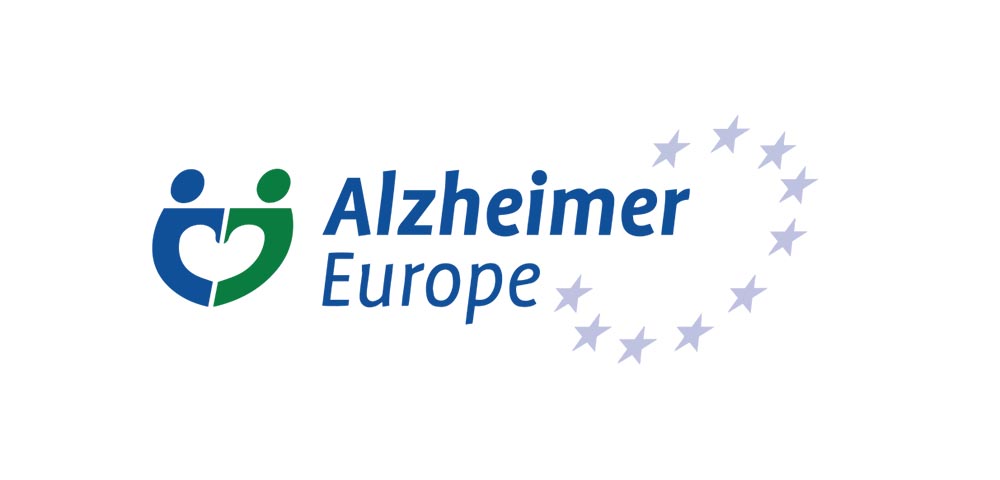Our opinion on …
Introduction
The current coronavirus (COVID-19) situation, which has now reached pandemic scale, is affecting millions of people across Europe and beyond in different ways. Physical distancing (frequently referred to as “social distancing”) is currently being recommended or enforced in most countries, and some cities, regions and countries are in lockdown.
In this statement, Alzheimer Europe looks at some of the key issues and challenges faced by people with dementia, informal carers, and health and social care professionals, and provides some recommendations. Many people with dementia are older and hence at greater risk of being adversely affected by this virus but not all people with dementia are older and the virus affects people of all ages. Having dementiaper seis not believed to increase the risk of contracting COVID-19 but people with dementia may find it more difficult to adopt or comply with various protective measures (e.g. linked to hand washing, coughing, distancing, isolation and lockdown) and to obtain necessary support during this difficult time. It is therefore important to be particularly vigilant during the pandemic in order to protect their wellbeing, safety and rights, and to ensure that they and their carers have the support they need.
Challenges for people with dementia during the COVID-19 pandemic
The COVID-19 pandemic, and the challenges that it poses, means that people with dementia may find their normal routines disrupted, lack cognitive stimulation, feel lonely and anxious, fear being abandoned and risk depression.
Some people with dementia, especially in the early stages, may cope relatively well and could perhaps provide valuable feedback to Alzheimer associations and service providers, and raise awareness about some of the potential challenges for people with dementia during the pandemic.
Others may experience a deterioration of their condition, sleep disturbances, a change in behaviour, self-neglect and premature institutionalisation. Even people with more advanced dementia, who do not fully understand the current situation, may be affected by the loss of support and sense the stress and emotional upheaval caused by COVID-19 through the people around them and in the media. They may have difficulty understanding ‘cocooning’ (at home or in residential care), distancing and the use of protective clothing (making it difficult to recognise service providers), resulting in them feeling trapped, abandoned, confused or scared. As day care centres close and home care services and visits from friends and relatives are either reduced or stopped, the needs of people with dementia risk going undetected or not being adequately met. Many health and social care professionals, as well as essential support staff with direct contact with patients and clients, need to isolate themselves, either as a precautionary measure or because they have the virus. This is a legitimate and responsible approach to the threat of COVID-19 but leads to staff shortages and further disruption of the care and support that people with dementia need.
There are some straightforward measures that people can take to protect themselves from COVID-19. However, people with dementia may put themselves and others at risk of infection if they do not understand, manage or remember to comply with such measures (linked to hand washing, coughing and not touching the face, maintaining a distance from others and, where recommended, wearing a mask). In some countries, failure to respect certain restrictions may result in fines and other penalties.
Distancing, accompanied by loss of support, lack of structure to the day and uncertainty about the duration of the measures may make it difficult for people with dementia to cope and, depending on their condition, to continue living independently. Those who live with other people may benefit from continued support, both practical and emotional, but some may have care responsibilities themselves (e.g. for children, partners and even parents). Moreover, the long periods of time spent together in close proximity, without outside support, may be challenging for all concerned.
Challenges for informal carers during the COVID-19 pandemic
Relatives, partners and close friends who provide informal care and support to people with dementia may encounter challenges during the pandemic (e.g. linked to a disruption of normal routines, loss of support and services, additional care responsibilities and concerns about their ability to cope). Some may have decided to cancel the support they had in an attempt to reduce the risk of infection. Where informal carers live with the person with dementia, the increased time together, the lack of support and concerns about coping may lead to tension, burnout and even abuse. Relatives and friends caring from a distance may have fewer opportunities to verify that the person with dementia is managing during the pandemic and to notice changes in his/her ability to cope and need for support.
There are various means of support for informal carers (and/or directly for people with dementia) but some of these are problematic during the pandemic. They may, for example, rely on people (who may not realise that they have the virus) entering the person’s home, on the use of Internet or on trusting strangers. Many carers are simply not aware of the support that is still available or do not think that they would be entitled to it. Many are older people who do not have access to Internet or are not comfortable using it. Difficulties with language, literacy and understanding, lack of trust, cultural and religious requirements and financial issues may result in some carers (and people with dementia themselves) not receiving information about the pandemic and available support or not feeling that the support on offer is suitable or corresponds to their needs.
Informal carers may also find distancing and isolation difficult, not only in terms of the provision of care and support, but also in relation to their own lives and wellbeing. They may lack emotional as well as practical support and have concerns about their ability to care for the person with dementia, especially when certain services were previously provided by professional carers (e.g. bathing, personal care and assistance with toileting). Carers who are older and have their own health conditions may find it particularly difficult to fulfil their caring responsibilities due to their own need to isolate and the limited services available during the pandemic. The lack of opportunities for respite and uncertainty about the duration of restrictions may be particularly challenging.
Challenges for health and social care professionals during the COVID-19 pandemic
Many health and social care professionals are striving to provide appropriate and timely treatment, support and care to people with dementia and informal carers despite fears for their own safety, and that of their families, and increased workloads resulting from reduced levels of staff. In many countries, protective clothing is scarce or inadequate, even in government-run establishments, and the situation for private care companies is often even worse.
Dementia is typically accompanied by difficulties with language and communication. Relatives and close friends contribute towards maintaining the psychological and emotional wellbeing of people with dementia. They also often play an important role in helping residents to communicate their needs, concerns and preferences to staff. Lockdowns and distancing measures make this difficult, if not impossible. People with dementia in care homes and hospitals, who are reliant on their carers for shared or supported decision making, are therefore particularly vulnerable when visits are restricted. This may also be the case with regard to legal representatives. Discharge procedures from hospitals may be more problematic as many informal carers are themselves in risk groups, previous levels of support are lacking and patients may have additional care needs. Health and social care professional who cross borders every day to reach their workplace may be hampered by lengthy border controls. Live-in migrant carers, who work on a rotation basis, may find themselves unable to work at all.
The restriction on visitors and the fear and anxiety surrounding COVID-19 may make it difficult for health and social care professionals to maintain the morale of their residents, patients and clients with dementia. This may increase the risk of loneliness, boredom and depression, and lead to behaviour which is difficult to manage. Opportunities to isolate people with dementia in residential care homes who are suspected of having COVID-19 may be limited and staff may have concerns about those people infecting other residents and/or that they themselves may need to self-isolate (thereby leading to further staff shortages). This dilemma is further exacerbated in some countries by the lack of testing opportunities for people in residential care homes and for staff.
Recommendations for Alzheimer Associations
Alzheimer associations can continue to support people with dementia and their informal carers by:
- providing information to people with dementia about the symptoms of COVID-19 and how and where to seek help in an accessible style and format, bearing in mind that people with dementia have different levels of education, literacy, familiarity with Internet and language skills, and are from different ethnic, cultural and religious backgrounds
- ensuring that people with dementia and informal carers are aware of services that are available during the pandemic and know how to access them
- providing guidance and advice to informal carers on how to support people with dementia both practically and emotionally (e.g. how to structure the day and keep the person active, ensure a good diet and, when possible, access to fresh air, manage medication and maintain social contact with others by phone or virtually) and how to look after their own needs
- maintaining telephone helplines and online support for people with dementia and informal carers, including links to additional information and resources
- making use of the latest technology such as zoom, Skype and web radio to promote social contact and face-to-face support, as well as of useful apps and online videos (e.g. for practical advice, counselling, chair exercises, yoga and keep fit, cognitive stimulation and information)
- exploring different methods of communication which do not rely on Internet access (e.g. printed leaflets, local radio stations to reach people in rural areas, messages from Minarets and in church bulletins to reach religious communities, newspaper articles and phone calls)
- coordinating support from dementia friends, volunteers and local branches (e.g. for shopping, meals and essential repairs, to collect medication, walk dogs and promote social contact)
Recommendations for health and social care professionals
Health and social care professions should strive to provide the best possible care and treatment for people with dementia within the constraints of preventive measures and restrictions, and staff shortages, with due attention to the rights, safety and wellbeing of the latter.
In order to achieve this:
- every effort should be made to facilitate contact with relatives and close friends of the person with dementia via phone and online communication, and in residential care homes to facilitate communication via modern technology between residents and relatives and friends
- when appropriate and subject to the agreement of residents/patients with dementia, informal carers and legal representatives should be contacted so as to enable them to contribute towards treatment and care decisions
- wishes and preferences expressed in advance care directives or life histories have to be respected
- particular attention should be paid to maintaining routines, providing information whilst not causing distress and providing emotional support to people with dementia
- under exceptional circumstances, such as emergency or end-of-life situations, limited visits from family members should be allowed only if safe for other residents and staff
Despite lack of resources, emotional stress and staff shortages, physical, mechanical and chemical restraint should not be used to manage difficult care situations. In extreme cases, if absolutely essential for the safety of the person concerned, any such use should be in accordance with legal requirements (e.g. for authorisation, supervision, documentation, proportionality and revision).
Recommendations for governments
Measures taken by governments to protect the public, including people with dementia and informal carers, from harm should be proportionate to risk and potential benefits. These should include:
- setting up a specialised team and developing a plan to address the needs of vulnerable groups during the pandemic to prevent the spread of the virus, guarantee equal access to necessary care and treatment, and to restore normal services and support post-pandemic
- ensuring priority testing (as soon as tests are available) to all health and social care staff, at all levels (e.g. including service and auxiliary staff) and irrespective of employment status (e.g. employed by the government, by private care providers or self-employed)
- minimising bureaucracy and unnecessary barriers which currently prevent health and social care professionals from providing essential services to vulnerable groups (e.g. by making cross border agreements and provisionally extending the residence rights of live-in migrant carers)
Governments should reach out to people with dementia in collaboration with national Alzheimer’s associations, with easy-to-understand information about the current status of the COVID-19 pandemic, protective measures and available support. This should include:
- messages and instructions regarding distancing which emphasise the need for physical distancing but encourage social interaction via phone, social media and online meeting apps
- easy-to-understand information and infographics that are not culturally-biased
- culturally sensitive and appropriate information specifically targeted at people from minority ethnic groups, developed with the help of people from the relevant communities
- information which corresponds to the needs of people with lower levels of education, literacy and language skills, as well as people with intellectual disabilities and impairments affecting communication and comprehension
Governments should allocate necessary financial resources and ensure that the logistics are in place so as to ensure that:
- the rights, wellbeing and safety of people with dementia are guaranteed, including access to formal support during the pandemic (e.g. to food, necessary medication, care and support, and protection from fraud, scams and abuse)
- NGOs and charities can continue providing valuable support and services
- all health and social care professionals have access to suitable and adequate personal protective equipment (PPE), irrespective of whether they work for the government, for private companies or independently
- essential medicines and disinfectants, and reliable information on their appropriate use, are made available
- younger people in paid employment are able to stay at home to provide full-time care, if needed, for people with dementia
- volunteers and voluntary organisations are able to respond to the needs of people with dementia and for the latter to be able to benefit from that support safely
This position was adopted by the Alzheimer Europe Board on 14 April 2020. This document builds on the recommendations identified at two Zoom meetings which Alzheimer Europe organised with the European Governmental Expert Group on Dementia (24 March 2020) and the association’s national member organisations (2 February 2020)


